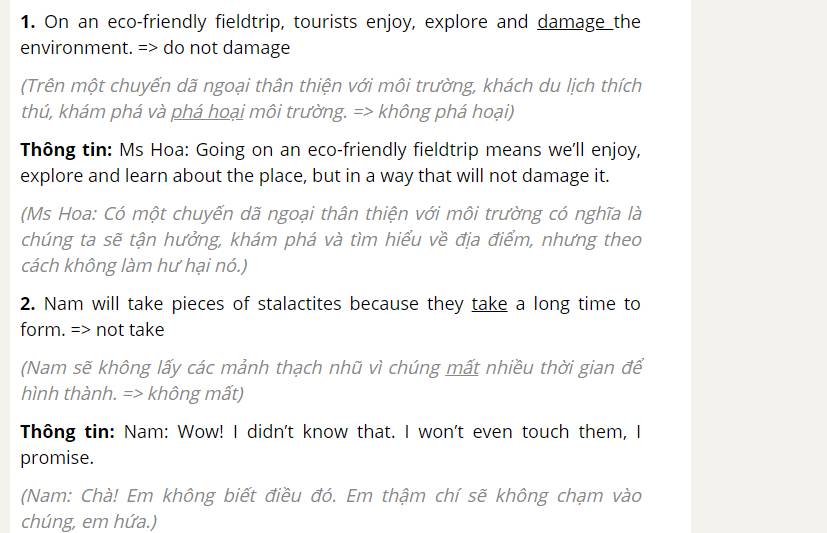Hãy nhập câu hỏi của bạn vào đây, nếu là tài khoản VIP, bạn sẽ được ưu tiên trả lời.

His name is Mike Perham. (Tên anh ta là Mike Perham.)
Yes. Because children are more carefree than adults, they do not have to be worry about earning money and other responsibilities. (Có, vì trẻ em thì vô lo vô nghĩ hơn người lớn, nên chúng không phải lo lắng về việc kiếm tiền và những trách nhiệm khác.)
Tạm dịch:
Ngày hôm qua, cậu bé mười sáu tuổi Hector Turner đã bắt đầu thử sức trở thành người nhỏ tuổi nhất Briton hoàn thành chặng “siêu ma-ra-tông” băng qua sa mạc Sahara. Vào cùng ngày, một sinh viên đại học 20 tuổi, Geordie Stewart, khởi hành đến Everest. Anh ấy muốn trở thành người trẻ nhất Briton hoàn thành thử thách “Bảy đỉnh núi” – leo lên mỗi ngọn núi cao nhất ở mỗi châu lục. Năm ngoái, Mike Perham đã đi vòng quanh thế giới một mình vào tuổi 17 bằng thuyền. Tại sao giới vị thành niên ngày nay cảm thấy cần thiết phải phiêu lưu và thám hiểm. Tại sao họ lại muốn có những trải nghiệm điên rồ như vậy? Mike Perham có một ý kiến: “Vì trẻ em thường mơ mộng hơn người lớn.”

a. We use (1) a/an to talk about something for the first time.
(Chúng ta sử dụng “a/an” để nói về thứ gì đó lần đầu tiên.)
There’s a interactive whiteboard in our classroom.
(Có một cái bảng tương tác trong lớp chúng ta.)
b. We use (2) the when we mention something again.
(Chúng ta sử dụng “the” khi nhắc về thứ gì đó lần nữa.)
Our teacher often uses the interactive whiteboard.
(Giáo viên thường dùng bảng tương tác.)
c. We use (3) the when it is clear what we are talking about, or when there is only one of something.
(Chúng ta dùng “the” khi thứ ta đang nói rất rõ ràng hoặc khi thứ đấy chỉ có duy nhất một cái.)
We play basketball in the gym. (The gym at school)
(Chúng tôi chơi bóng rổ trong nhà thi đấu. (Nhà thi đấu ở trường.))
The sun is shining.
(Mặt trời đang chiếu sáng.)
d. We use (4) a/an to say what someone's job is.
(Chúng ta dùng a/an để nói về nghề nghiệp của một người.)
My mum's a teacher.
(Mẹ tôi là giáo viên.)
e. Note these set phrases (Chú ý các cụm từ cố định)
- (5) the: listen to the radio, go to the cinema, play the guitar.
(nghe đài radio, đi rạp chiếu phim, chơi ghi-ta)
- (6) no article: watch TV. listen to music, in/ to bed, to/ at / from school, at home / work, in hospital
(xem TV, nghe nhạc, trên/ lên giường, đến/ tại/ từ trường, tại nhà/ nơi làm việc, trong bệnh viện)

Give the correct tense or form of the verbs in brackets.
a. The ladder looks unstable. It (1. fall) _will fall_ apart. I wish I (2. have) had enough time to do something
about it.
b. My teacher was not at home when I (3. arrive) _arrived___. She (4. just/ go) has just gone__ out.
c. By the time he (5. return) _returns_____ next year, his daughter (6. already/ leave) _has already left__ school.
d. I (7. never/ read) _have never read_____ any novels (8. write) _was written_____ by a Korean author.
e. She (9. walk) _walked_____ all the way home. That's why she (10. be) _is__ tired now.
f. I dis living in London because it (11. rain/ always) _(always rains/is always raining)___.
g. The plane had taken off before they (12. arrive) __arrived____ at the airport yesterday.
h. The children seemed (13. be) _/__ surprised to hear the news.
Câu h này hình như sai đề,câu này đủ rồi,cấu trúc seem phải thế này cơ mà
Subject + seem + adjective
i. A: Why are you holding a piece of paper?
B: I (14. write) _am writting___ a letter to my friends in Texas.
j. The Titanic (15. cross) __was crossing____ the Atlan when it (16. strike) struck______ an iceberg.
k. Ted: It is so hot in here!
Sarah: I (17. turn) will turn______ the air-conditioning on.
l. By the time he stopped at the first gas station, he (18. drive) _has driven_____ for three hours.
m. Wind (19. come) _comes_____ from differences in air pressure.
n. My brother is the only one (20. realize) ___realized___ the danger.
+ Mình làm chắc còn sai,có gì mọi người chỉ bảo...
potato potato bạn ơi, câu h đúng mà, có cấu trúc SEEM TO BE mà bạn


dùng to để chỉ mục đích =))